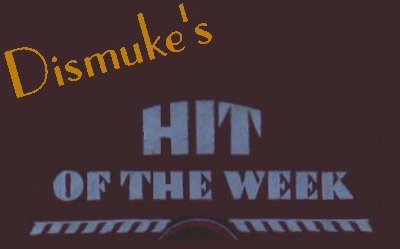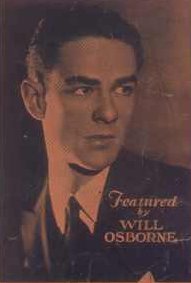

February 2004
February 26, 2004
This week's Hit of the Week is brought
to you by

KAYWOODIE COMPANY
(from 1938 ad)
Crashin'
Thru
Joe Daniels and His
Hot Shots In "Drumnastics"
1939
(Decca 3370-A mx CE9782 (U.K.Parlophone))
Moonglow
Joe Daniels and His
Hot Shots In "Drumnastics"
1937
(Decca 1792-B mx CE8465 (U.K.Parlophone))
Drummer
Man From Dixie
Joe Daniels and His
Hot Shots In "Drumnastics"
1938
(Decca 2725-B mx CE9229)
This week's selections feature an
excellent British jazz band that I think has been undeservedly overlooked
by modern audiences. To my knowledge, there has only been one CD
reissue of the band's recordings, a British release on the Vocalion label.
Joe Daniels was a drummer in several British dance bands, including the
Harry Roy Orchestra before forming his own band in 1935. All
of the recordings featured this week are from American pressings on Decca.
In Britain the band's records were released on the Parlophone label.
Daniels must have had some amount of following in the USA as the American
Decca pressings are not that difficult to come across.
EXTRA
Note: In the past, I have featured
an "extra" recording whenever the mood hit me to do so or when I upgraded
the audio files elsewhere on the website. Starting this week, "extras"
will appear more frequently and with a somewhat different format.
I will use this space to present 78 rpm recordings that do not fall within
the range of the vintage pop and jazz fare that I usually present.
Instead, I will feature recordings from a wide variety of eras, musical
genres and nationalities as well as occasional spoken word recordings.
One of the more enjoyable aspects of buying a bulk lot of 78 rpm records
is that one comes into possession of recordings that one would not normally
seek out and purchase. I have made many wonderful discoveries this
way that have expanded my musical horizons. My hope is that, in the
weeks and months ahead, these "extra" recordings will do the same for you
as well.
Amorettenreigen
- Waltz
Orchestra Mascotte with Edith Lorand
1928
(Parlophone R191 mx 34918)
Wiener
Praeterleben - Waltz
Orchestra Mascotte with Edith Lorand
1938
(Parlophone R191 mx 34749)
I think both of these recordings
are quite beautiful.
Edith Lorand was a world famous
violinist in the late 1920s and 1930s who played a musical style known
as "salon music" which was popular in Europe and in more refined American
circles from the 1870s through the 1930s. Salon music basically consisted
of classical and light classical works, selections from operas, operettas
and musical comedies and popular dance tunes performed by small groups
of classically trained musicians. Salon orchestras typically provided
background music at elegant hotels, restaurants and social gatherings
Unfortunately, the only biographical
information I could find about Edith Lorand was on a German
language website.- and online translation services have definite limitations.
Lorand was born in Hungary in 1898 but spent most of her early career in
Germany. She was a prolific recording artist and her records sold
extremely well. She also toured extensively throughout Europe.
Lorand, who was Jewish, was forced to flee Germany after the Nazis came
to power in 1933 and made it impossible for her to find employment in that
country. Lorand moved to Hungary but anti-Semitism became a problem
for her there as well under a government which was increasingly aligned
with Nazi Germany. In 1937, Lorand fled Europe for safety in
the United States where she spent the rest of her life.
The recordings featured here are
from pressings issued by the British Parlophone label which imported a
lot of material from Europe. My guess is that the recordings were
made in Germany, but I cannot be certain.
"Amorettenreigen" was written by
Czech composer Julius Fucik. "Wiener Praterleben" was composed by
Siegfried Translateur.
February 19, 2004
This week's Hit of the Week is brought
to you by

THE COCA-COLA COMPANY
(from 1938 ad)

Listen
To The Glissin'
Will Osborne And His Orchestra
Will Osborne, vocal
1937
(Decca 1915-B mx 63117)
So
Lovely
Will Osborne And His Orchestra
Bob Gibson, vocal
1938
(Decca 1915-A mx 63817)
Would'st
Could I But
Kiss
Thy Hand Oh Babe
Will Osborne And His Slide Music
"Doghouse" Dale Jones, vocal
1940
(Varsity 8143 mx US1158)
Rosalie
Will Osborne And His Orchestra
Will Osborne, vocal
1937
(Decca 1467-B mx 62615)
Will Osborne was a bandleader from
the mid 1920s until the late 1950s. Though he is largely forgotten
today, in the early 1930s he was a well-known vocalist and participated
in a much publicized on-air radio "feud" with Rudy Vallee over who deserved
credit for inventing "crooning."
Like most of the longer lasting
dance bands, the Will Osborne orchestra changed with the times and sought
out ways to differentiate itself from the competition. In the late
'30s and early '40s the band employed a stylistic gimmick that Osborne
called "Slide Music" which emphasized slide trombones played into cardboard
megaphones. All of the recordings in this week's update are
from this period. Osborne himself describes the style in the lyrics
of "Listen To The Glissin'." Osborne was also a composer and had
several hits to his credit including "Pompton Turnpike" and "Between 18th
And 19th On Chestnut Street." He was also the composer of this week's
recording "Would'st Could I But Kiss Thy Hand Oh Babe" - and the song's
title is not the only thing unusual about the recording. "Rosalie" is a
Cole Porter composition and the title song of a 1937 musical picture
staring Nelson Eddy and Eleanor Powell.
Will Osborne retired from bandleading
in 1957 and became the music director for Harvey's Casino in Lake Tahoe,
Nevada.
February 12, 2004
This week's Hit of the Week is brought
to you by

MARSHALL PARIS HOTEL CO.
Operators
Hotel Marshall - Marshall, Texas
Hotel Gibraltar - Paris, Texas
Wade Hotel - Duncan, Okla
(from circa ? matchbook cover)
Diga
Diga Do - Parts 1 & 2
Bob Crosby and His Orchestra
1938
((Decca 2275-A mx 91538, Decca
2275-B mx 91539)
Stomp
Off And Let's Go
Bob Crosby and His Orchestra
1939
(Decca 2379-B mx 64928)
Martha
(Ah So Pure)
Connie Boswell, vocal
with Bob Crosby's Bob Cats
1937
(Decca 1600-A mx DLA 1066)
The Bob Crosby band was formed in
1935 around the remnants of the Ben Pollack Orchestra which had broken
up the previous year. Deciding that they wanted to remain together,
the musicians formed a corporate organization headed by sax player Gil
Rodin with the Rockwell-O'Keefe booking agency as part owner. Recognizing
that he did not have the public persona necessary to be a successful front
man, Rodin, at the suggestion of Cork O'Keefe, offered the position to
Bob Crosby. While Crosby's resume included stints as vocalist for
the Anson Weeks and Dorsey Brothers orchestras, having an older brother
named Bing, who just happened to be the nation's most popular crooner,
certainly did not hurt his chances. Crosby was not a musician and
his function was strictly that of a front man and occasional vocalist.
Behind the scenes it was Rodin who ran the organization. The
band was extremely successful and is regarded by many as one of the big
band era's better white jazz bands. Its style was mostly - though
not exclusively - Dixieland, something which was very much out of step
with the times during the late 1930s when swing was overwhelmingly dominant
and Dixieland was considered by some to be "old fashioned" and "corny."
This week's recording of "Diga Diga
Do" has been in my collection for who knows how long - but it wasn't until
recently that I finally got around to playing it for the first time.
The song, composed by Dorothy Fields and Jimmy McHugh was originally introduced
a decade earlier in the all-black Broadway musical Blackbirds of 1928.
The Crosby band's swing rendition of it is a great example of how the band
could, from time to time, break away from its usual Dixieland fare.
The recording takes up both sides of the 78 rpm record - thus the Parts
1 & 2. Thanks to the wonders of modern technology, however,
you will not have to turn the record over halfway through!
"Stomp Off And Let's Go" is one
of the band's better known recordings and an excellent example of its Dixieland
style.
"Martha (Ah So Pure)" is another
recording that I only recently got around to giving a listen and I was
immediately impressed by what I consider to be its pretty and almost haunting
tune. Turns out that the song was already 90 years old when
this recording was made. The song was originally from the Friedrich
von Flotow opera Martha which premiered in Vienna in 1847.
Jazz vocalist Connie Boswell was one of the three Boswell Sisters, a very
successful female vocal act in the early 1930s. When sisters
Martha and Vet retired in 1936, Connie successfully continued her career
as a soloist. A victim of childhood polio, Boswell was confined
to a wheelchair - and, as with FDR, this fact was often camouflaged in
public appearances and publicity photos.
February 5, 2004
This week's Hit of the Week is brought
to you by

Click On Image For Larger View
CRANE
Equipment & Plumbing Fixtures
(from 1923 ad)

School
House Blues
Bennie Kreuger's Orchestra
1922
(Brusnswick 2181-B)
I've
Got My Habits On
Bennie Kreuger's Orchestra
1922
(Brunswick 2181-A)
By 1922, jazz had all but replaced
ragtime as the inspiration for popular dance recordings. Note that,
unlike the recordings I recently featured from the previous decade, the
arrangements on this week's selections do not simply repeat the same passages
over again as if someone were trying to fill out the side of the record.
The commercial dance recordings of the early '20s may not have featured
a great deal of the spontaneity and improvisation on the part of the musicians
that is associated with the era's more "pure" jazz bands. But the
new acceptability of improvisation had a profound impact on arrangers who
suddenly felt free to depart from the stock versions issued by the
music publishing houses and were thus able to recraft the song in ways
that could fill out up a record without sounding repetitive and monotonous.
"School House Blues" is an Irving
Berlin composition which was featured in Berlin's Music Box Review of
1921. The review played at Broadway's Music Box Theatre which
is still in use to this day. "I've Got My Habits On" was composed
by comedian Jimmy Durante
For more information about Bennie
Kreuger, check out the October 30, 2003 update which you can find
in the "Previous Selections" archive below.

|


